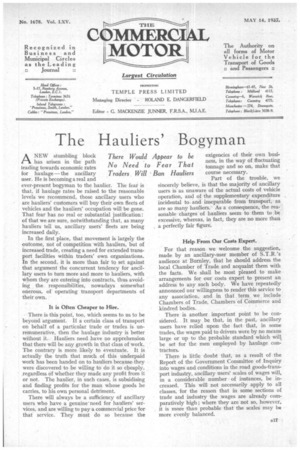The Hauliers' Bogyman
Page 27

If you've noticed an error in this article please click here to report it so we can fix it.
ANEW stumbling block has arisen in the path leading towards economic rates for haulage — the ancillary user. He is becoming a real and ever-present bogyman to the haulier. The fear is that, if haulage rates be raised to the reasonable levels we recommend, those ancillary users who are hauliers' customers will buy their own fleets of vehicles and the hauliers' occupation. will be gone. That fear has no real or substantial justification : of that we are sure, notwithstanding that, as many hauliers tell us, ancillary users' fleets are being increased daily.
In the first place, that movement is largely the outcome, not of competition with hauliers, but of increased trade, creating a need for extended transport facilities within traders' own organizations. In the second, it is more than fair to set against that argument the concurrent tendency for ancillary users to turn more and more to hauliers, with whom they are entering into contracts, thus avoiding the responsibilities, nowadays someWhat onerous, of operating transport departments of their own.
It is Often Cheaper to Hire.
• There is this point, too, which seems to us to be beyond argument. If a certain class of transport on behalf of a particular trade or trades is unremunerative, then the haulage industry is better without it. Hauliers need have no apprehension that there will be any growth in that class of work. The contrary is more likely to eventuate. It is actually the truth that much of this underpaid work has been handed on to hauliers because-they were discovered to be willing to do it so cheaply, .regardless of whether they made any profit from it or not. The haulier, in such cases, is subsidising and finding profits for the man whose goods he carries, to his own personal detriment.
There will always be a sufficiency of ancillary users who have a genuincneed for hauliers' services, and are willing to pay a commercial price for that service. They must do so because the exigencies of their own business, in the way of fluctuating tonnage and so on, make that course necessary.
Part of the trouble, we sincerely believe, is that the majority of ancillary users is as unaware of the actual costs of vehicle operation, and of the supplementary expenditure incidental to and inseparable from transport, as are so many hauliers. As a consequence, the reasonable• charges of hauliers seem to them to be excessive, whereas, in fact, they are no more than a perfectly fair 'figure.
Help From Our Costs Expert.
For that reason we welcome the suggestion, made by an ancillary-user member of S.T.R.'s audience at Burnley, that he should address the local Chamber of Trade and acquaint them with the facts. We shall be most pleased to make arrangements for our costs expert to present an address to any such body. We have repeatedly announced our willingness to render this service to any association, and in that. term we include Chambers of Trade, Chambers of Commerce and kindred bodies.
There is another important point to be considered. It may be that, in the past, ancillary users have relied upon the fact that, in some trades, the wages paid to drivers were by no means large or up to the probable standard which will be set for the men employed by haulage contractors.
There is little doubt that, as a result of the Repot' t of the Government Committee of Inquiry into wages and conditions in the road goods-transport industry, ancillary users' scales of wages will, in a considerable number of instances, be increased. This will not necessarily apply to all classes, for the reason that in some sections of trade and industry the wages are already comparatively high ; where they are not so, however, it is more than probable that the scales may be more evenly balanced.




















































































